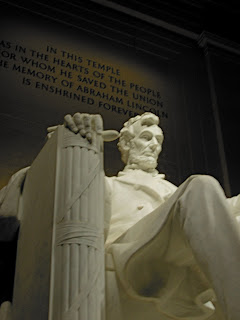While being "misted"on, we walked all the way to the Capitol. We looked at it, noticed how pretty it was, and started walking to the Washington Monument. On our way there, we noticed the surprisingly large amount of people jogging around. These people were hardcore. They were jogging in shorts and sweaters in the cold mist. Only one of them smiled at us.
The WWII Memorial led to the reflecting pool, which led to the Lincoln Monument. On our way to the Lincoln Monument, we asked a man where the Vietnam Memorial was, because if it was not 10 feet away, we weren't going. It actually was about 10 feet away. We decided to check out Lincoln, then see the Vietnam Memorial on our way out.
The steps leading to the Lincoln Monument were very steep and very slick from the rain. We were hoping to see an adolescent bust it, but we were not so lucky.
There are no words to describe the Lincoln Monument. I can say it is beautiful, magnificent, even wondrous- but none would truly do it justice.
There were signs asking people to be quiet in respect.
We walked around, looked up at Lincoln in silence and read the Gettysburg Address, which was engraved on one of the walls.
Then we went to the Vietnam Memorial. We looked at the huge wall of names, which I was not comfortable taking a picture of, and visited the Women's Memorial. It was very humbling.
I also learned, while silently observing the Women's Memorial, that an 8th grade boy likes his women thin, but with muscles. But not too muscular like a bodybuilder. Just as long as he couldn't beat him in an arm wrestling match.

After the Women's memorial, we spent the last hour looking for the Metro station.
See, we never really bought a map of D.C. Andi memorized the map she found while researching D.C, but we did not have a map in our hands. All that we had was the Metro map, which gave a VERY general location of the Metro stations. We were looking for the Smithsonian, because there should have been a station near there. We never did find the Smithsonian...
Instead, we accidentally found the White house. We asked one of the guards where the nearest Metro was, and he told us it was 3 blocks that way -- which was great, but when we went three blocks that way, there was no Metro station.
So after we realized there was no Metro station, we walked into this food court looking thing and asked a guard where the Metro station was. Apparently we were looking for the Federal Triangle Metro station, and it was "just around the restaurant and take a left."
We went around the restaurant, all the way to the road and looked to our left... No Metro station. By this time we're delirious because our feet hurt, we're soaked and we still can't find the Metro!
We went to some valet parkers in front of a fancy building and asked them. They said it was behind the building, from where we just came!!!!! He said go behind the building and we should see a big blue M... We can't miss it. Did that-- no M.
Leigh, Andi and I walked behind the building, and found some servers taking a break. We asked them where the Metro was, and they started arguing in Spanish about whether it was to the left or right.(as translated by Leigh Gentry)
Finally, a server actually steps forward and says, "What are you looking for?" He tells us to look for a rose sculpture, which by now we've passed twice, and to go down some stairs behind the rose. Take a right, and it will lead to the Metro.
At last: some SPECIFIC directions. No one told us that the Metro station was on a lower level behind the rose statue. We came to the conclusion that the last guy must have been from the South, because all Northern people are not nice.
Then we found the Metro station, rode to DuPont Circle and decided to eat some well-deserved supper at 10 p.m.













